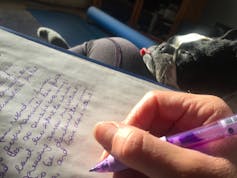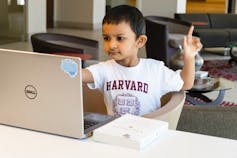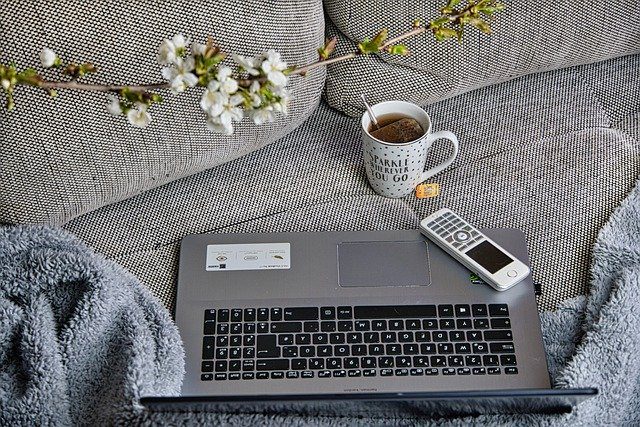The COVID-19 lockdown has become synonymous with working from home for many people. While some research has suggested that remote work can be isolating, it also makes the competing priorities that workers are juggling very visible — even sometimes literally so due to the popularity of video calls.
This has the potential to unite workers with the feeling that they are in this struggle of balancing work and personal responsibilities together.
Whether it’s kids or pets that are popping up onscreen during Zoom calls, remote work has caused a relaxation in the traditional rules of professional presentation and resulted in a virtual workplace that is not only more flexible, but also more humane.

(Piqsels)
My preliminary research on how remote work has impacted professionals at accounting firms across Canada suggests that working from home has important implications for how accountants, or any professional working from home for that matter, communicate their expertise and credibility in a virtual workplace.
My survey of these workers suggests that what it means to behave “professionally” has changed, and that the pandemic has made clear the necessity of being able to bring one’s authentic self to work.
Read more:
5 expert tips for working from home in a crowded house during the coronavirus pandemic
According to a recent survey by Statistics Canada, nearly one-third of businesses report that their employees are working remotely during the pandemic lockdown.
That’s almost twice the level reported before the lockdown began. The survey also found that just over one-quarter of employers said they’re likely to offer more employees the chance to continue remote work once the COVID-19 pandemic has passed, with almost 15 per cent saying they plan to make it mandatory.
The accounting firm workers I interviewed suggested that almost all of their companies will allow employees at all seniority levels to work from home, at least part-time, going forward. Remote work is here to stay, and will likely have a lasting impact on how work is conducted.
Making the personal visible
Working from home provides a bird’s eye view into the personal lives of our colleagues, clients and even our bosses. With every Zoom call, we find ourselves being allowed into the private spaces of our co-workers in unprecedented ways.
Zoom meetings have made the personal lives of our colleagues visible. Take for instance a British professor’s now-famous on-air intrusion, when her daughter interrupted her while she was being interviewed by the BBC. But Clare Wenham, a working mother at home with her child, is not the exception but rather the rule during the COVID-19 pandemic.
My research suggests that rather than detracting from how one is perceived professionally, these glimpses into co-workers’ personal lives can improve workplace interactions.
Seeing a colleague’s cat or meeting their child on-screen provides a sense of community that people used to get at work and are now desperately craving. These on-camera interactions allow workers to reconnect or get to know one another in a new way.

(Rohit Farmer/Unsplash)
They also enable employees to see their colleagues as human beings with competing priorities, and they consequently become more flexible and understanding as work and personal lives overlap. This may mean being more tolerant of a missed deadline or more understanding of an unconventional work schedule.
Workwear increasingly casual
There’s lots of tips available on how to dress when working from home, but my research suggests that since the beginning of the lockdown, workwear has become increasingly casual.
While a minimal level of formality is maintained during video calls with clients, respondents are increasingly casual with their colleagues. Some respondents even report hosting virtual “Pyjama Mondays” as a fun team-building activity.
The decision to dress more casually is not only a desire for comfort, but also reflects both how employees feel about themselves and how they want others to perceive them.
In the book You Are What You Wear: What Your Clothes Reveal About You, clinical psychologist Jennifer Baumgartner explains that clothes often reflect how you feel about yourself. For harried employees who are juggling multiple personal and professional commitments, being seen in a hoodie and yoga pants illustrates the challenges they’re facing during the pandemic.

(Daria Nepriakhina/Unsplash)
But this can be a double-edged sword. Activities like Pyjama Days could undermine perceptions of expertise, maturity and competence.
According to one study on dressing for success:
“After just a three-second exposure to pictures of one man in a bespoke suit and one in a suit that is off-the-rack, people judged the man in the bespoke suit more favourably. Experiment participants also rated him as more confident, successful, flexible and a higher earner.”
Focus on competence, not presentation
But my respondents suggest that remote work removes the focus from what people are wearing to what they say and what they can do. Remote work provides the opportunity to level the playing field and emphasize talent and expertise over how employees present themselves.
Altogether, my study reveals the potential positive benefits of working from home during a global pandemic.
But will this represent a permanent shift in work attitudes?
While my respondents tell me that their firms are implementing permanent plans to allow all employees to work remotely, I certainly hope that the positive changes I’m observing in the workplace continue whether people are at home or in the office.![]()
Erica Pimentel, PhD Candidate in Accounting, Concordia Public Scholar, Concordia University. This article is republished from The Conversation under a Creative Commons license. Read the original article.










